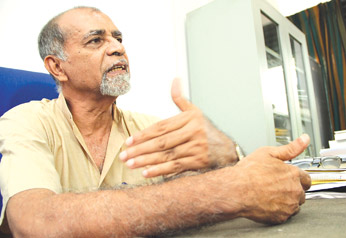Talk is one thing, action quite another
Manjula Fernando
 |
|
Prof. Jayadeva Uyangoda
Pic: Sudam Gunasinghe |
Prof. Jayadeva Uyangoda, a respected academic is one of the
professional members of the National Institute of Education (NIE)
Council, removed by the Education Minister a fortnight ago. Currently in
Delhi, as Rajni Kothari Chair, Center for the Study of Developing
Societies (CSDS), Prof. Uyangoda in an email interview given to the
Sunday Observer explained what happened. Excerpts:
Q: Do you think the proper procedure was followed when the
professional members were removed from the NIE Council ?
A: No, I don't know. They may have followed the procedures, in
the sense that, the Minister has the right to remove the Council
Members.
Q: Any reasons given, in the letter received by you (from the
Secretary)?
A: There were no reasons given, except to say that the NIE no
longer needed my services.
Q:What could have prompted the Education Secretary to take
that sudden decision?
A: I don't know the reasons. My guess is that probably they
needed a council which would work with the DG, with no criticism,
dissent, disagreement, or ideas for reform, or a commitment to the
government's initial policy of transparent good governance. But, the
Secretary, Education may not have taken this decision on his own.
As he himself admits, he wrote the letter on the Minister's
instructions. But, interestingly, the Secretary shared all our concerns,
criticisms and proposals made at Council Meetings.
There was no disagreement whatsoever, between us and the Education
Secretary, who is the ex-officio chair of the Council.
Q: The official media release issued by the Media Secretary of
Education Ministry on July 26 read- "there were serious internal
disagreements within the Council and it was affecting the progress of
the NIE". Do you agree with this statement?
A: There were serious disagreements between the DG and us on
governance issues, as well as on the role and responsibilities of the
NIE. We were arguing for a robust and energetic role to be played by the
NIE in all aspects of its mandate in accordance with the NIE Act,
whereas the Acting DG had a very minimalist understanding of what the
NIE should be doing.
We saw the NIE as an institution allowed to decay and decline under
the previous government. We argued for its revival and regeneration
through reforms, capacity building and good and accountable governance.
There were discussions, debates and disagreements on these issues, and
they were not necessarily bad. Probably, people who had been used to a
culture of command, authoritarianism and voluntary submission to
authority for years, saw debate and dissent as something strange,
unusual and unacceptable. Paradoxically, the NIE was, and is, in such a
severe institutional crisis that neither the NIE officials nor the
Education Ministry could comprehend that it was in a crisis!
Q: Do you plan to take up this issue with any higher
authorities in the government? Will you resort to any future action over
this sudden removal from the Council?
A: Dr. Nirmal and I wrote to the Prime Minister, after he took
over the NIE under his office, a long letter, in May this year,
explaining the institutional crisis of the NIE and making suggestions to
resolve the crisis. We even proposed a comprehensive institutional
review for the NIE. The PM of course acknowledged our letter through his
secretary. We don't know of any follow up action.
I don't think I want to take any further action on the issue, except
reflecting on how difficult it is to reform and regenerate Sri Lanka's
public sector institutions even under a government that has come into
power promising such an agenda. But, I have an intellectual and personal
commitment to strengthen the public discourse on good governance
reforms. This experience is an example I can use, to make a case for
revisiting and re-inventing the good governance agenda.
Q: What were your expectations for the NIE and our school
education sector?
A: The NIE should do what it is required to do by the Act.
Advising the Minister on education policy, doing regular and quality
research for that objective, revising and updating syllabi and teacher
guides, launching new initiatives for school text books in all three
languages, in collaboration with other government entities, broadening
its teacher training programs -- all these require capacity building of
the NIE, particularly, at its top level.
Tragically, the NIE does not seem to comprehend that there is a
serious crisis in Sri Lanka's school education sector.
Q: In the aftermath of this development, do you regret taking
up this Government position?
A: No, I don't regret. We made an effort. It failed and taught
me some important lessons about the nature of the Sri Lankan State as
well as the public sector institutions, and the limits of what political
leaders say and actually do.
This experience made me a bit wiser. |

